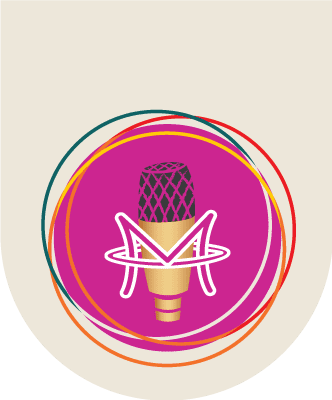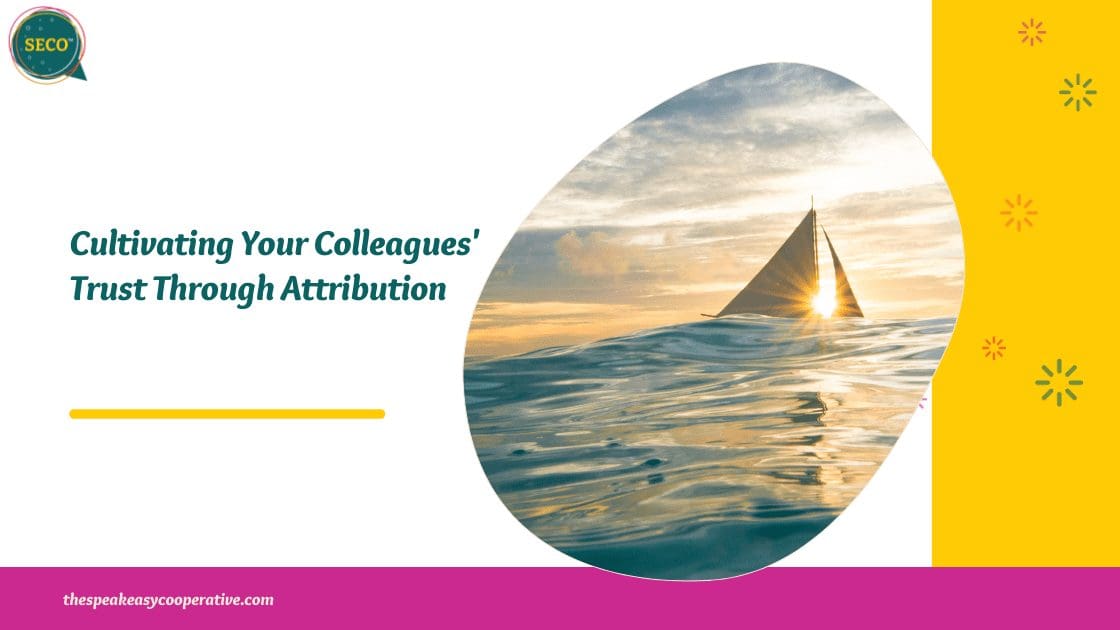It’s Christin here, flouncing in to take over today’s article. If you don’t know me, HI! I’m Community Manager and Copy Coach for The SpeakEasy Cooperative and co-founder of Sand Dollar Music.
Today, I’m here to tell you a story about…
The Easiest Way To Make Your Colleagues Love You
So! Here’s what happened:
The setting: My kitchen table, a few years ago, a mug of lukewarm coffee in hand.
The scene: My disgustingly full inbox.
The email: “Hey, Christin! I’m updating my website–can you proofread this for me?”
::starts reading::
“Ha, that sounds like something I would say.”
::keeps reading::
“Oh wow, I did say that somewhere.”
::keeeeeps reading::
“This is…um…my writing. I wrote almost all of this.”
As I read, I realized: this person’s website consisted almost entirely of cobbled-together copy from my website, blogs, social media posts, and studio policies. They had not asked permission, coached with me, linked back to my site or socials, or offered any form of compensation or acknowledgement. They presented my words as their own, then asked me to edit them…as if I wouldn’t notice.
I wish I could say that was the only time it happened. But over the years, I’ve seen my words, images, and ideas pop up all over the great wide Internet…in places I didn’t put them. It happens to friends and colleagues too–people with much larger followings and much grander work than mine.
In fact, if you’re someone who dares to say what you think, it’s probably happened to you too.
Whether it’s a just-spouting-off Facebook post or a lifetime of research, seeing your ideas passed off as someone else’s is always a shock.
And it always feels gross.
No matter how chill you try to be, no matter how generous and gentle you are, no matter how many times you take the high road, when a good portion of your life is devoted to the development and distribution of ideas, having someone pass off those ideas as their own is a violation. And it’s no trifling matter. Having your intellectual property stolen or misused can lead to damaged professional relationships, damaged reputations, damaged careers, lost income and opportunities, and so much more.
So what do we do? Because there is much goodness out there that needs sharing. And sometimes the same idea occurs to multiple people at the same time. And we live in a world where everyone’s thoughts and images are out there on the Internet all the time anyway.
So how do we share the cool stuff without…::shudders::…thievery?
It’s simple: attribute.
This word gets thrown around a lot in the voice world, and depending on the setting, there are specific protocols for proper attribution. (For example, attribution in a journal article looks different from attribution on Instagram.) But it doesn’t have to be fussy. At its heart, attribution simply means acknowledging the originator.
Why would we want to do that?
- Honesty. It does a disservice to our audiences, our reputations, and our creative souls to present content as our own when it is not. Whether intended or not, it’s a lie.
- Reputation. When we attribute people’s work (especially if we connect with them first), it widens our professional spheres and causes us to be seen as trustworthy, ethical colleagues.
- Collegiality. When our colleagues thrive, our field thrives. When our field thrives, we thrive. It is a beautiful, respectful, empowering thing to cite a colleague’s work–and it costs us nothing. They get the recognition they deserve, and we look smart for giving that recognition. To quote Michael Scott (<—attribution, hey!), it’s a win/win/win.
How do we do that?
In The SpeakEasy Cooperative (come hang out with us!), we have an “ask and attribute” policy.
- Ask the owner’s permission to share the thing we want to share.
- If they say yes, ask how they would like to be named and if there are any larger works, resources, etc. they would like us to cite or link to.
Citing sources in academia
Side note: In academia (unless they’ve changed it in the 13 years since I did my master’s–feel free to correct me, professor friends!), asking permission is not common practice, but citing sources absolutely is. And if you’re citing a person who is still alive, it surely doesn’t hurt to email them, thank them for their work, and let them know where you’re referencing it.
Whether it’s an Instagram post, a journal article, a presentation, a blog, or…anything, really…If you’re sharing a concept, resource, image, or anything that originated from someone else, simply name that person. And if you learned that concept, resource, etc. from a course, book, presentation, etc. by the person, name that too.
When we choose to slow down for a moment–to cite our sources–to ask for permission to quote, share, or post–we cultivate a more thoughtful, respectful, intentional world.
We live in an on-demand culture. The shows we want, the music we want, and the information we want are limited only by our wifi speed. Through social media, we can access anyone we want any time we want. Everyone and everything is a download or an @ away. Because of this, it’s easy to forget that everything on the Internet isn’t ours for the taking. But when we choose to slow down for a moment–to cite our sources–to ask for permission to quote, share, or post–we cultivate a more thoughtful, respectful, intentional world.
As my friend Michelle often says (<—attribution!), “A rising tide lifts all boats.” When we name each other freely, when we shine the spotlight on our colleagues in the right way at the right time, we elevate our entire field to a place of abundance.
You can learn about Christin on the SECO team here or get in touch directly here.
A rising tide lifts all boats
P.S. Michelle here! Nerd Alert! While we are on the topic of attribution… did you know that the phrase “a rising tide lifts all boats” is often misattributed? Yeah! Check out what I learned on Wikipedia recently:
“The phrase is commonly attributed to John F. Kennedy,[1] who used it in a 1963 speech to combat criticisms that a dam project he was inaugurating was a pork barrel project.[2][3] However, in his 2009 memoir Counselor: A Life At The Edge Of History, Kennedy’s speechwriter, Ted Sorensen, revealed that the phrase was not one of his or the President’s own fashioning. It was in Sorensen’s first year working for him, during Kennedy’s tenure in the Senate, while Sorensen was trying to tackle economic problems in New England, that he happened upon the phrase. He wrote that he noticed that “the regional chamber of commerce, the New England Council, had a thoughtful slogan: ‘A rising tide lifts all the boats.'” From then on, Kennedy would borrow the slogan often. Sorensen highlighted that as an example of quotes mistakenly attributed to Kennedy.[4]
In subsequent decades, the phrase has been used to defend tax cuts and other policies in which the initial beneficiaries are high-income earners.[5]
In addition, the phrase (水涨船高) has been used in the Chinese language for centuries and first appeared in The Gallant Maid (兒女英雄傳), a novel by Wen Kang, a Manchu-born Qing dynasty author.”
P.P.S I first heard the phrase from my sister in law, who owns High Tide consulting. YAY!






0 Comments